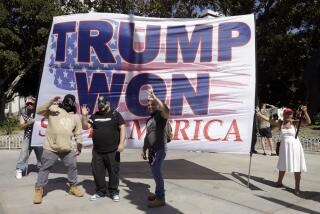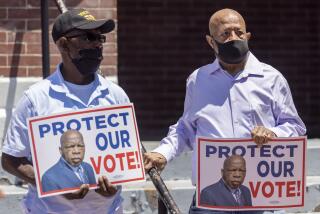Tolerance Isn’t a One-Day Event
- Share via
MOSTAR, Bosnia and Herzegovina — Election day in Mostar was a genuine lesson in civic rights, a display of true brotherhood. What a shame that Mostarians ruined it all by voting the way they did. What a shame indeed that the result of the local election, widely seen as a test run for Bosnian national elections, was a lesson in isolationism, a pitiful show of ethnic bias.
June 30 was the sunniest day I’ve seen in four years of visits to this bitterly divided town (Croats on the West bank of the Neretva river, Bosnian Muslims on the East bank). Electoral rules required current and former Mostarians to cast their ballots in the polling stations where they lived in 1991. Thus, thousands of them crossed the river and, for 12 hours, the ethnic mix was re-created as if by a magician’s spell.
As an election monitor with the International Crisis Group, I watched dozens of buses bringing voters to polling stations across the river. Grown-ups were glued to the windows like children arriving at Disneyland: Many Mostarians saw the other part of their town for the first time since the beginning of the war.
The atmosphere was of a class reunion. Former neighbors hugged and kissed, asking for news of common acquaintances, commenting on weight gained or lost over those years, the whiteness of their hair and the height of their children. In some instances, invitations to come for coffee followed.
Suddenly, the barrier of fear dropped. On that one day there was more freedom of movement in Mostar than in the whole time since the peace agreement was signed in Dayton, Ohio, last December. In the polling stations, members of electoral commissions and monitors from political parties were ethnically promiscuous. By 9 p.m., during the ballot counting, representatives of mutually hostile nationalist parties were acting like old buddies, bumming cigarettes and sharing Cokes.
These reunions, limited as they were, put the lie to the propaganda that had instilled ethnic hatred. For a few brief hours, the initiative was hijacked from the separatist political leaders and put in the hands of citizens.
So is Marshal Tito’s slogan for the old Yugoslavia, “Brotherhood and Unity,” revived and well? Not so fast.
Because conditions did not really exist for free campaigning, reasonable, multiethnic parties were unable to present their programs. Thus the results are as they are: The two vociferously nationalist parties representing the Croats and Muslims took an overwhelming majority of votes. With two months to go before the all-Bosnian election that will be held under the auspices of the Organization for Cooperation and Security in Europe, certain lessons can be drawn for that vote:
--The heavy presence of NATO troops, foreign monitors and journalists were important in making an orderly and technically correct election possible in a hostile environment. The same massive presence will be needed in September, too.
--Twelve hours of electoral carnival in Mostar was not enough to change the voting patterns formed (or deformed) by four years of vicious war propaganda on top of 40 years of Communism. But many of the contacts established that Sunday will be followed up by meetings, phone calls and trade links between Mostarians from the two banks of the Neretva. On the larger scene, however, if nothing is done by the international community to ensure the establishment of telephone links between the Muslim-Croat Federation and Serb Republic (one cannot currently place a call in either direction) distance and hostility will be more difficult to overcome.
--Guaranteeing freedom of information throughout Bosnia and Herzegovina could undermine the reign of the nationalist extremists over the minds of the people inside their respective turfs. Yet, as of today neither the Croat part of the federation nor the Serb Republic have a daily paper other than the ruling party’s rag. Thus, for instance, a Croat running in the Mostar election on a multiethnic platform was more popular among Bosnians in East Mostar (who hear and read some dissenting views) than among his fellow Croats in West Mostar, whose indoctrination is almost total.
--Ensuring freedom of movement is a necessary condition--not so much for the actual casting of ballots, which in September can be done by absentee vote, but for the electoral campaign and (as the Mostar mingling proved) for the simple de-vilifying of the other ethnic groups. Had Mostar’s election been drawn out over five days, the inter-ethnic problems would have been greatly reduced, each hug and coffee invitation doing wonders.
When the head of the OSCE mission in Bosnia, American Robert Frowick, says that the elections are only a first step in a lengthy democratization process, he gets his priorities wrong. The above conditions must be fulfilled now, well before the September 14 vote, to encourage fair and free balloting. Any other course risks election of extremists who may well make these first post-war elections Bosnia’s last.
More to Read
Sign up for Essential California
The most important California stories and recommendations in your inbox every morning.
You may occasionally receive promotional content from the Los Angeles Times.













